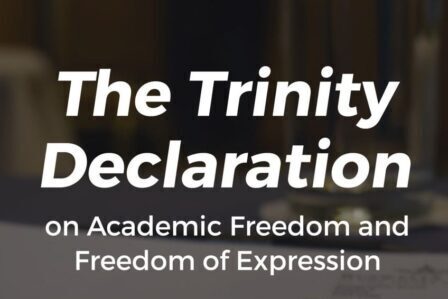
The Trinity Declaration
This is the text of a speech by Tim Crowley read at the launch of the Trinity Declaration on Academic Freedom and Freedom of Expression on 18 April 2024.*
On behalf of Dublin Academics for Academic Freedom, I welcome the Trinity Declaration. It is a powerful call to Irish universities to respect and promote academic freedom. Moreover, it is similar in its aim to the demand made by AFAF in February that universities, in the UK and Ireland, should adopt institutional neutrality, as set out in that great document, the Kalven report.
But, while it is welcome, it is a sorry state of affairs in which we find ourselves that a declaration such as this is needed. In the Universities Act we have a bold and strong protection for academic freedom. The duty of our universities towards academic freedom is made very clear: the university has a duty and the responsibility to protect and promote academic freedom.
But this duty is routinely ignored. I challenge anyone working or studying at an Irish university to identify a policy that has had the intention or effect of promoting academic freedom; policies are promulgated that don’t even protect academic freedom—indeed, that are at odds with academic freedom.
Given the lack of compliance, whether through ignorance or otherwise, towards the Universities Act, pessimism as to whether tonight’s Trinity declaration might have any influence would be understandable.
But let’s be optimistic. We do have reason to be. At Ireland’s biggest university, the new president has made positive noises about the importance of free speech and academic freedom. And indeed she has received praise from Academics for Academic Freedom for her position on the Israel-Hamas war.
Noting that she has had requests from students and faculty to commit the university to a particular position on this issue, Professor Feely explained that to do so would be to inhibit the ‘freedom of members of our community to express their individual positions and suppressing our ability to sustain and respect a diversity of views’.
Even more strikingly, the president referred to the Kalven report as the basis for this response. President Feely has maintained that position, even in the face of fierce criticism from students and activist faculty.
President Feely’s endorsement of institutional neutrality, and recognition of the importance of a diversity of views, and indeed her very awareness of the Kalven report, is a very good sign indeed. But it falls short of a full endorsement of institutional neutrality.
In particular, President Feely ultimately endorses institutional neutrality with regard to, as she puts it, ‘geopolitical matters’. But Kalven is about sociopolitical matters in general—arguably it is more to do with such matters than geopolitical or international matters. Full institutional neutrality means not taking an institutional position on all of the matters of the day—for instance, matters of social justice. But this is what our universities are doing—what they are obliged to do, in fact. For, as long as the HEA is infected by Advance HE, and its demand for universities to commit to Anti-Racism principles, and also to the Athena Swan scheme, academic freedom is being unacceptably compromised.
In the latter case, of Athena Swan, as is well known, display of commitment is tied to eligibility for funding from all of Ireland’s research funding bodies. This is an outrage that must be ended.
University presidents of Ireland should follow the path set by President Orla Feely. But President Feely is herself only so far along that path. Statements like this evening’s Trinity Declaration may help to push her further—to be a wind at her back, and lead UCD and the other universities towards the goal of academic freedom. There can be no half-Kalven.
*Dr Tim Crowley is Assistant Professor in the School of Philosophy at University College Dublin and the convenor of Dublin Universities AFAF. The Declaration was launched by Free Speech Ireland.


